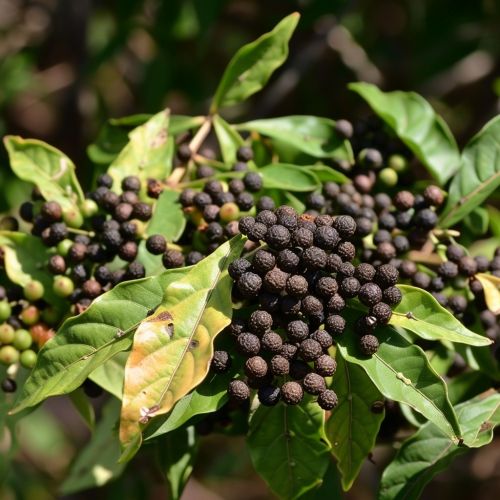Piper nigrum
Taxonomy and Botany
Piper nigrum, commonly known as black pepper, is a flowering vine in the family Piperaceae, cultivated for its fruit, which is usually dried and used as a spice and seasoning. The species is native to Kerala in southwestern India, where it is organically grown in the rich, fertile soil of the tropical rainforests.
The plant is a perennial woody vine growing up to 4 metres (13 ft) in height on supporting trees, poles, or trellises. It is a spreading vine, rooting readily where trailing stems touch the ground. The leaves are alternate, entire, 5 to 10 cm long and 3 to 6 cm across. The flowers are small, produced on pendulous spikes 4 to 8 cm long at the leaf nodes, the spikes lengthening up to 7 to 15 cm as the fruit matures.


Cultivation and Harvesting
The black pepper plant is a tropical plant requiring a long rainy season, fairly high temperatures, and partial shade for best growth. Propagation is generally by stem cuttings, which are set out near a tree or a pole that will serve as a support. Pepper can be grown in soil that is neither too dry nor susceptible to flooding, moist, well-drained and rich in organic matter.
The fruits of the black pepper are harvested before they are fully ripe and then dried. The dried peppercorns are black in color and have a wrinkled appearance. The process of drying, which can take up to a week, also leads to the development of the characteristic dark, wrinkly outer layer of the peppercorn.
Culinary Uses
Black pepper is one of the most commonly used spices worldwide. It’s made by grinding peppercorns, which are dried berries from the vine Piper nigrum. It has a sharp and mildly spicy flavor that goes well with many dishes. But black pepper is more than just a kitchen staple. It has been deemed the “king of spices” and used in ancient Ayurvedic medicine for thousands of years due to its high concentration of potent, beneficial plant compounds.
Chemical Composition and Health Benefits
Black pepper is rich in a plant compound called piperine, which has been found to have potent antioxidant properties. Studies suggest that a diet high in antioxidants may help prevent or delay the damaging effects of free radicals.
Piperine, the active ingredient in black pepper, has been shown to improve brain function, boost nutrient absorption and gut health, and even fight off cancer cells. It has also been found to have anti-inflammatory properties, which can help reduce inflammation and pain.
Trade and Economy
Black pepper is one of the most widely traded spices in the world. The spice has a significant impact on the economy of several countries that produce it, including India, Indonesia, and Vietnam. The global trade in black pepper is estimated to be worth several billion dollars annually.
